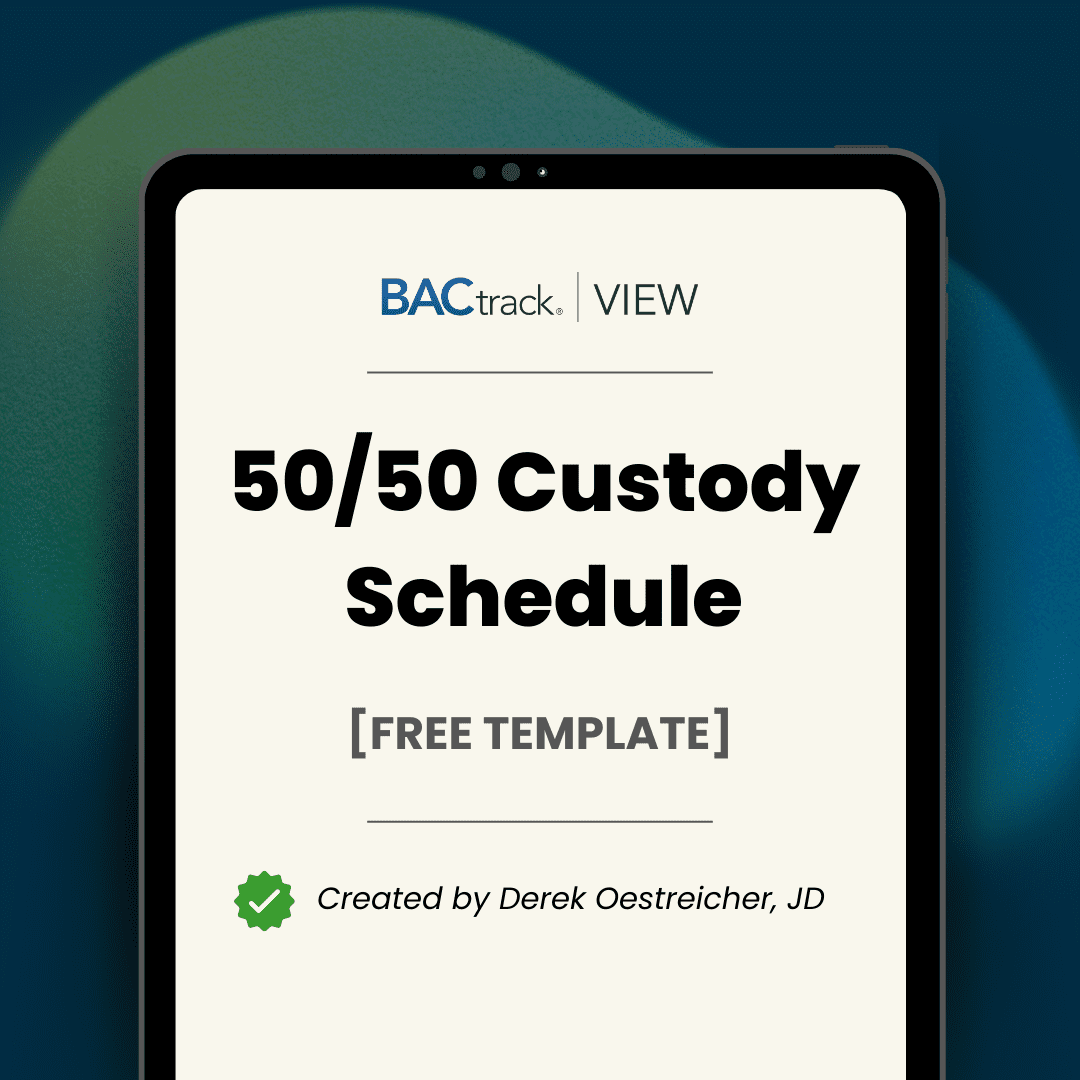In my years as a family law attorney, one of the most rewarding aspects of my work has been helping separated or divorced parents craft parenting plans that actually work. This means the plans don’t just look good on paper, they actually work in real life. And if there’s one parenting schedule I work with more than any other, it’s the 50/50 custody schedule.
Equal parenting time has become the go-to model for many families. This is especially true when both parents want to stay deeply involved in their children’s daily lives.
And here’s the truth: Even when circumstances are far from perfect (when there are trust issues, recovery efforts, or communication challenges) a well-structured 50/50 plan can offer children the stability and love they need from both parents.
This kind of arrangement requires intention, structure, and in some cases, tools like BACtrack View to ensure accountability (when substance abuse is involved). But when done right, it can be a life-changing framework for families in transition.
In this guide, I’ll…
- Explain the most common 50/50 arrangements
- Share a free parenting plan template
- Show how tools like alcohol monitoring can help build trust when sobriety is a concern.
50/50 Custody Schedule: Sample Clause + Template
What does a 50/50 parenting plan look like?
At its core, a 50/50 parenting plan splits physical custody right down the middle. Each parent gets the kids for roughly half the year, or about 182 overnights annually. This arrangement aims to provide stability and equal involvement for both parents in their children’s lives. To facilitate a smoother transition and ensure that both parties are on the same page, many recommend utilizing a free custody evidence checklist. This resource can help parents track important dates, activities, and responsibilities, ultimately aiding in the effective communication needed for a successful co-parenting relationship.
Of course, whether a 50/50 arrangement is best really depends on developmental needs and emotional security. As the California Learning Resource Network explains, custody decisions should account for attachment and stability – not just equality.
A popular option: The 2-2-5-5 custody schedule
One of the most popular ways to divide that time is through a 2-2-5-5 schedule. It’s simple, predictable, and often easier on children because the routine doesn’t constantly shift. Let’s break this down:
- Parent A: 2 days in a row
- Parent B: 2 days in a row
- Parent A: 5 days in a row
- Parent B: 5 days in a row
So, to illustrate, here’s a common 2-2-5-5 setup:
- Parent A: Every Monday & Tuesday
- Parent B: Every Wednesday & Thursday
- Weekends: Alternated between parents from Friday to Monday morning
This rotation creates five-day stretches of parenting time every other week, giving each parent a good mix of weekdays and weekend involvement.
This is not be the only way to do it – other families opt for week on/week off arrangements, or a 3-4-4-3 split, but the 2-2-5-5 model offers consistency with fewer abrupt transitions.
Why equal time works – even in challenging situations
When families are on relatively even footing, a 50/50 plan makes sense. But I’ve also seen it succeed when things were not so balanced.
I once represented a dad who was rebuilding his life after rehab. He had just regained stable housing and a steady job. He was working hard to maintain his sobriety. His ex-partner was skeptical, but after a few months of steadiness, she agreed to try a shared schedule.
The result? They transitioned to a 2-2-5-5 plan, and their daughter flourished under the new consistency.
Studies from the Institute for Family Studies suggest that 50/50 custody arrangements are associated with improved employment and income for single mothers – and even broader benefits like better mental and physical health for committed fathers. These findings highlight the positive impact that shared parenting can have on both parents and children, fostering a collaborative approach to co-parenting. Moreover, for parents seeking to play an active role in their children’s lives, regaining custody can often lead to a stronger, more supportive family dynamic that benefits everyone involved.
To illustrate this: In another case, a mother working rotating hospital shifts was worried that a 50/50 schedule would be too disruptive to her children. We crafted a flexible version of the plan, adjusting days monthly based on her work calendar. The father, who worked a traditional schedule, agreed to the plan, and both parents ended up with equal time and a much stronger co-parenting relationship.
A 50/50 schedule works when parents are willing to plan thoughtfully, communicate clearly, and prioritize their child’s well-being over everything else.
How alcohol monitoring can build trust and accountability
One of the biggest concerns in high-conflict or recovery-based cases is safety. If alcohol abuse is part of a family’s history, co-parenting can be incredibly sensitive. That’s where remote monitoring technology, like BACtrack View, becomes a game-changer.
BACtrack View allows scheduled breathalyzer tests that are submitted through a smartphone. The results are instantly shared with the other parent, attorneys, and even the court. If a test is skipped or failed, backup plans – like supervised exchanges or temporary suspension of parenting time – can be triggered.
Parents who use tools like BACtrack View can restore trust and build confidence in their co-parenting relationship. It can provide hard evidence of sobriety and create a layer of trust that many co-parents need to move forward confidently with a 50/50 arrangement.
These systems don’t just document sobriety. They support redemption.
Encouragement for the road ahead
If you’re in the early stages of divorce – or trying to figure out custody on your own – you might feel overwhelmed. That’s okay. I’ve had countless clients walk into my office with doubt, fear, and tension. I’ve watched these same parents walk out months later with restored confidence, healthier routines, and stronger relationships with their kids.
You don’t have to be in a perfect situation to make a 50/50 schedule work. You just have to be committed to:
- Showing up
- Being consistent
- Creating a plan that reflects your child’s needs
With good legal guidance, that’s entirely possible.
The bottom line on 50/50 custody schedules
Equal parenting time offers children a chance to stay connected to both parents, maintain routine, and feel secure – even during major life changes. A 50/50 plan isn’t about perfection – it’s about presence.
If you’re committed to parenting well after separation, there’s a structure that can support you. With trust, accountability, and cooperation (even when it’s hard), you can build a schedule that brings stability to your family and healing to your future.

